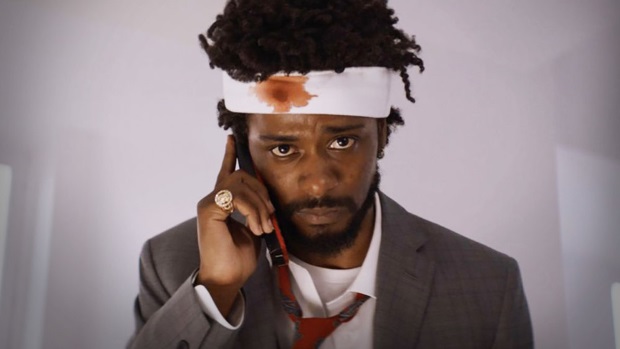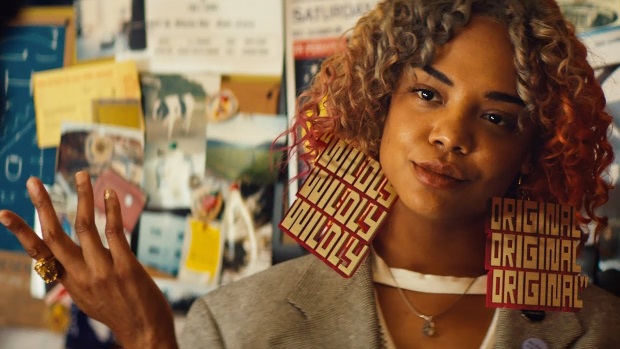Sorry To Bother You director: ‘Corporate culture is all about fear’
After its US success, Boots Riley’s out-there satire is finally hitting UK cinemas. He explains why it's important to take creative risks
One of the surprise breakout hits of the year, Sorry To Bother You is a biting satire of modern corporate culture, class systems and race in a year when such topics are part of everyday conversation. However, the fact that the film was written – and published as a book – years ago makes its insights into modern life feel even more prescient.
Given the film’s fiercely original proposition, it’s hard to imagine there was no pushback from interested movie studios when writer/director Boots Riley was pitching his vision back in 2014. “It’s hard to push back – people are either down or they’re not,” he says. “Especially in this independent film space. It might have been different if this was a heist film but with one small part that’s different, but my thing was so much not like anything else that there was never going to be just one part that someone didn’t like.”
According to Riley, only one thing was changed from the original 2014 script – a reference to ‘Making America Great Again’ that he cut so as not to confuse the film’s message. Sorry To Bother You is not just a critique of the Trump era specifically, but of capitalism more widely.
A deeply political film, Riley wanted it to stay with people as a demonstration of what the realisation of one’s power can do when used in a certain context.
“What I put in there is the hope for change,” he says, “which comes through not just this vague notion of social action, but through a movement that uses the withholding of labour as a tactic – not just for higher wages, but also for social change.
“It’s saying that this is what we are living like now, and the things I wanted people to look at was power, where that power actually lies. Even for folks in a movement, it comes down to wanting to get the word out, but it’s really about people knowing what leverage they have.”

It was important for the film to be understood as an exaggeration of present-day America, Riley continues, rather than a dystopian future that’s far away from our everyday reality.
“I had to really balance that, because I had read that Terry Gilliam had been frustrated with Brazil because people thought it was set in the future,” he explains. “Even though at the beginning it says, ‘Somewhere in the 20th century.’ But that’s because the production design was so pushed that it seemed like it was saying it was the future.”
Back in the summer, Riley questioned the lack of international distribution for Sorry To Bother You, writing on Twitter that, despite outperforming many other movies at the US box office, it was being treated as a “black movie” that would not do well internationally.
“Corporate culture, in general, is all about fear,” Riley tells Den of Geek when asked about the distribution issue. “Not even just the film industry, but the music industry. They try to say that capitalism breeds innovation but it doesn’t. People are trying to invest in things they think are creative but are just like, ‘Oh, this is creative because it’s a purple version of the black shoe we’ve been making this whole time.’
“My movie is thought of as wild, but it’s not that crazy. I think people do the same thing that they’ve been doing and they just assume certain things. They want to sell what was sold last time, and even when something does well, like Get Out, they decide that it’s an anomaly. It’s then a self-fulfilling prophecy. I’m glad that Focus/Universal came through and made it happen.”

On the subject of Get Out, it’s true that Sorry To Bother You has been compared to the 2016 hit primarily because it features a large black cast and discusses race in modern America.
“We got our funding before Get Out was released,” Riley says. “It was already going to happen, but I think some of the success comes from theatres saying, ‘Okay, we will buy this because Get Out did something.’ So it’s more around those things, but we already had our funding… I’m happy when people are talking about it. It annoys me when they think it was inspired by Get Out, because the actual screenplay was published as a paperback book in 2014.”
With more and more high-profile films, from comedies to superhero films, wrapping a discussion of social issues in a populist wrapper, Sorry To Bother You stands out for wearing its politics and world-view on its sleeve. First and foremost a brilliant comedy, it’s impossible to exit the cinema without elements of the film’s message sticking in your brain.
“Any time you’re talking about the way you think about life, or the world, it’s exaggerating something in order to focus on it,” says Riley. “Contradiction is very much like irony, and irony is a big way to explain tragic things. But irony is also at the heart of a lot of comedy, and often they’re one and the same.”
Sorry To Bother You is in selected UK cinemas from Friday 7 December